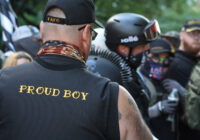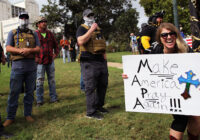Opposition to the postwar liberal world order seems like the new back to normal, as it is based on a natural impulse to shut out the feared “other” in order to be safe, rather than recklessly open and vulnerable. Neurobiologist Robert Sapolsky notes why this back to normal is natural and instinctive. He cites John Mitrani to examine “human group identity … in-group bias … [and also] the biological and cognitive underpinnings that shape them.”
With populist nationalism making waves on both sides of the Atlantic, along with authoritarian states trying to reshape the functioning of the liberal world order, the debate is heavily centralized around Europe and the US, with a similar focus paid to their authoritarian contenders such as China and Russia.
In this climate, one can only wonder how these trends play out on the global fringes. For instance, the radical right has made a rousing comeback in Sri Lanka, fed by two highly-visible phenomena: finding the enemy in Islam and populist nationalism.
The Graveyard Demon
The Brigade of the Great Graveyard Demon (MSB) sounds like something from a horror movie. Known as Mahason Balakaya in Sinhalese, the group was named after an ancient mythical being, most probably a local version adapted from the “Egyptian Book of the Dead,” which reveals some aspects of the pseudo-belief system of the radical right. MSB was founded in a Buddhist temple in central Sri Lanka in August 2013. As of 2018, it is said to have 273,000 active members.
Hardly anyone would expect a political belief system behind such an odd name. Yet the aims of MSB are to protect the majority Sinhalese Buddhists from a supposed an encroachment by Muslims. The group is alleged to have incited several attacks against the Muslim minority that makes up 9.7% of Sri Lanka’s population. The Sri Lankan government has designated MSB as a terrorist organization, though its ideological material continues to appear online.
So, what makes some Sri Lankans believe there are hidden enemies who plot to overpower the majority Sinhalese Buddhists? Muslims are the latest addition to the long list of historical enemies — from colonizing Portuguese, Dutch and British to the Tamil minority in the country — who were all branded as existential threats to the Sinhalese Buddhist identity and the nation that they see as theirs.
With the significance of Islamic fundamentalism in the post-9/11 world, it was relatively easy to politicize the idea of a Muslim takeover that is said to be looming against Sinhalese Buddhist heritage. But the Muslim population has ancient roots in Sri Lanka. The first Muslims to arrive on the island were Arab spice merchants who came in the eighth century AD. However, the idea of Sinhalese Buddhists in Sri Lanka being of the most prominent rank is a widely-held view, which has been politicized by nationalist governments and groups for political gains.
Taking Over Sri Lanka
MSB propagates a narrative that reverberates with the historical anxiety of majority Sinhalese Buddhists, striking a chord of popular nationalist sentiments. This narrative defines the new enemy as Islam and Muslims who, as per MSB, plot to take over the island. To help fabricate this idea, MSB has distributed leaflets claiming that Muslims are buying business premises in major cities. According to the MSB leader, Amith Weerasinghe, Muslims own everything while the Sinhalese are losing their businesses and towns. This idea has no factual basis whatsoever. It is an attempt to portray any Muslim business as a threat to the majority population.
With the Muslim minority being merchants from generation to generation, the visibility of Muslim businesses was always part of the culture on the island. Given that their traditional livelihoods are rooted in business, asking Muslims not to trade is like asking them not to exist. This, however, is exactly what MSB would like to achieve by proposing Sinhalese Buddhist settlements in historically Muslim-majority areas in the east. The group has also planned to open Sinhalese Buddhist shops with a specific aim to boycott Muslim-owned businesses.
Another grievance has involved mosques. Mosques have been built throughout the country, and the government gives Muslims the land to do so. For Weerasinghe, history is not taught in schools — at least “his” version of it — facilitating Muslim extremists who seek to change the status quo of the island and conquer Sinhalese Buddhist heritage.
To make the case more intimidating, MSB claims that several Muslim-majority countries have connections to Muslims in Sri Lanka, thus giving the impression that they are co-conspirators aiding Sri Lanka’s minority Muslims in an Islamic takeover. In an interview with Hari TV, Weerasinghe claims that “around 500 arrivals a day take place from Muslim countries in the Middle East, and Afghanistan and Pakistan.” This is clearly a misinterpretation. These people can be anyone who arrives in Sri Lanka from Muslim-majority countries, including non-Muslim Sri Lankans. Nevertheless, the MSB leader advances the idea of a hidden conspiracy behind such visitors.
Rooted in Conspiracies
MSB’s ideas are rooted in such conspiracy theories, and its narratives are based on generalizations and falsifications about Islam. However, the Easter Sunday attacks that rocked Sri Lanka in April provided legitimacy that MSB and other similar groups have long lacked. In fact, Islamist factions have operated on the island under the early influence of al-Qaeda and, later, the Islamic State group. That said, suggesting that all Muslims in minority communities are plotting for Islamic takeover is a form of anti-Muslim prejudice and a fabricated conspiracy.
In pushing its narrative, MSB has created a mythic enemy: the Muslim minority in Sri Lanka. This includes alleged co-conspirators such as the government and foreign powers who are seen as plotting against Sri Lankans. Secondly, MSB defines the victim as only the Sinhalese Buddhist majority, aiming to create a space to position the group as Sri Lankan patriots.
In keeping with a familiar trait of the contemporary radical right, Weerasinghe also endorses strongmen such as Vladimir Putin and Donald Trump, calling them patriots who have brought their countries back from the brink. He even goes so far as to lament the lack of such a person in Sri Lanka’s mainstream politics but insists that he has created thousands to be the future torchbearers.
MSB’s followers are up to no good in maligning the island’s entire Muslim minority as “threats” and inciting hatred and violence against them.
*[The Centre for Analysis of the Radical Right is a partner institution of Fair Observer.]
The views expressed in this article are the author’s own and do not necessarily reflect Fair Observer’s editorial policy.
Support Fair Observer
We rely on your support for our independence, diversity and quality.
For more than 10 years, Fair Observer has been free, fair and independent. No billionaire owns us, no advertisers control us. We are a reader-supported nonprofit. Unlike many other publications, we keep our content free for readers regardless of where they live or whether they can afford to pay. We have no paywalls and no ads.
In the post-truth era of fake news, echo chambers and filter bubbles, we publish a plurality of perspectives from around the world. Anyone can publish with us, but everyone goes through a rigorous editorial process. So, you get fact-checked, well-reasoned content instead of noise.
We publish 3,000+ voices from 90+ countries. We also conduct education and training programs
on subjects ranging from digital media and journalism to writing and critical thinking. This
doesn’t come cheap. Servers, editors, trainers and web developers cost
money.
Please consider supporting us on a regular basis as a recurring donor or a
sustaining member.
Will you support FO’s journalism?
We rely on your support for our independence, diversity and quality.








Commenting Guidelines
Please read our commenting guidelines before commenting.
1. Be Respectful: Please be polite to the author. Avoid hostility. The whole point of Fair Observer is openness to different perspectives from perspectives from around the world.
2. Comment Thoughtfully: Please be relevant and constructive. We do not allow personal attacks, disinformation or trolling. We will remove hate speech or incitement.
3. Contribute Usefully: Add something of value — a point of view, an argument, a personal experience or a relevant link if you are citing statistics and key facts.
Please agree to the guidelines before proceeding.